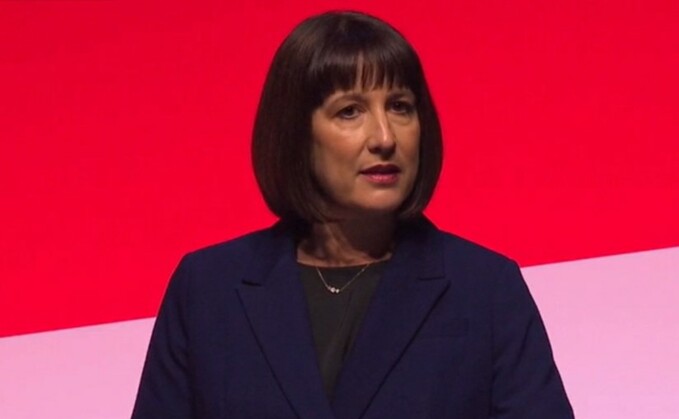Labour rejects Conservative claims recent falls in energy prices would wipe out promise to cut household bills by £300 by 2030
Labour and the Conservatives have again clashed over their rival energy and climate plans, after Shadow Chancellor Rachel Reeves today reiterated the Opposition's plans to place green energy at the heart of efforts to tackle the cost-of-living crisis.
The government this morning celebrated new inflation figures confirming inflation fell to two per cent last month, meeting the Bank of England target for the first time in three years.
Prime Minister Rishi Sunak said it was "great news" inflation was "back to normal" and at a lower level than Germany, France, and the US. "When I become Prime Minister inflation was at 11 per cent, but we took bold action, we stuck to a clear plan, and that is why the economy has now turned a corner," he said.
However, Labour has contested the idea the economy is recovering given GDP growth stood at zero per cent last month. And analysts have warned today's reduction in inflation is not expected to lead to an interest rate cut this month. Experts have also warned the UK could see inflationary pressures ratchet back up again in the autumn, with a climate-impacted harvest set to lead to higher food prices and energy bills likely to rise again.
"Thanks to record high gas stock levels across Spring, we have seen declining global energy prices and this has fed through to the recent fall in UK inflation," said Sam Hollister, head of economics, policy and investment at analyst firm LCP Delta. "However, our latest analysis reveals worrying signs that higher energy costs could rebound this autumn. With storage levels beginning to be eroded and supply threatened by the ongoing war in Ukraine, households are faced with the real risk of an inflationary sting heading into winter as energy bills look set to rise."
Speaking today as part of Labour's week of campaigning on economic issues, Reeves accused the government of a complacent approach to household bills that are still at historically high levels.
"After 14 years of Conservative chaos, working people are worse off," she said. "Prices are still sky-high in the shops, mortgage bills are higher and the price of energy has soared. This election has exposed a Conservative Party that is staggeringly out of touch with the struggles facing ordinary families. The Conservatives have no plan to tackle the cost of living and instead are offering a desperate wish list of unfunded promises that will mean £4,800 more on people's mortgages."
She added that Labour would "tackle the root causes of the cost-of-living crisis", including through the creation of a "publicly owned clean energy company to power Britain's future energy security, take control of our energy supply and bring down bills".
However, Labour's plans to launch a new clean energy investment vehicle called GB Energy today faced accusations from the government that it would not deliver a promised £300 reduction in average bills and could even push up costs for households.
Energy Security and Net Zero Secretary Claire Coutinho published a new analysis arguing Labour's projected £300 savings were based on energy prices from last year which have subsequently fallen.
"Labour's GB Energy proposal is a gimmick that won't generate any energy and won't cut bills, whilst the rest of Labour's policies put Britain's energy security at risk," she said, in comments reported by The Telegraph. "Now we know that not only will Labour increase your taxes by at least £2,094, but [Shadow Energy and Climate Secretary] Ed Miliband's latest vanity project will put up your energy bills too."
Conservative claims Labour would put up taxes by over £2,000 over four years have been repeatedly rejected by Labour, who have countered large swathes of the government's tax and spending plans are unfunded.
And a Labour spokesperson dismissed the latest claim GB Energy would push up bills as "more desperate nonsense from a Conservative Party whose failure means that every family has paid the price for 14 years of failed Conservative energy policy through higher energy bills".
"Their nonsense analysis ignores the basic reality that energy bills are due to rise this winter by £200, and the Office for Budgetary Responsibility (OBR) has warned of a similar price spike in the next Parliament - with average household bills rocketing by £940 - if the UK remains dependent on global fossil fuel markets," they said.
Labour's projection that its energy plans could save households £300 is based on modelling from think tank Ember that shows how a clean power system by 2030 would be much less exposed to volatile fossil gas prices, which have been the primary driver behind high energy prices over the past three years. As such, savings are still expected to result regardless of any short-term volatility in wholesale gas prices.
The latest row comes as Carbon Brief published an update to its analysis calculating the impact of the Conservative government's 2013 decision to "get rid of the green crap" on energy bills by slashing spending on energy efficiency programmes, axing renewable energy subsidies, ditching planned energy efficiency standards for new homes, and blocking the development of onshore wind farms in England.
The influential website calculated that had rates of energy efficiency improvements and onshore renewables development been allowed to continue at their pre-2013 level, and had David Cameron continued with his full suite of climate policy plans, the UK's energy bills would have been £22bn lower over the past decade.
"The £22bn added to energy bills since 2015 as a result of the rollbacks includes £9bn due to not having built more cheap onshore wind, £5bn due to poorly insulated homes, £5bn due to low solar deployment and another £3bn because new homes were less efficient than the Zero Carbon Home standard," Carbon Brief said. It added that the UK's gas demand was 99 terawatt hours (TWh) or 14 per cent higher than it would have been if climate measures had been maintained at earlier rates, meaning the UK's net gas imports are now 31 per cent higher than they would have been if policies that were characterised as "green crap" were kept in place.
Labour's plans to accelerate decarbonisation efforts and slash the UK's gas imports have been broadly welcomed by business groups and campaigners. But they have also warned sweeping reforms will be needed to even get close to its target of having a clean power system by 2030.
"Building more offshore wind, getting going once again with a new generation of onshore wind farms and rapidly giving the green light to a fleet of Small Modular Reactors is the only way to deliver a secure, domestic and clean energy supply for Britain that will bring bills down for millions of households," said Sam Richards, founder of pro-growth campaign group Britain Remade. "However, time and time again our outdated and sluggish planning system holds Britain back… Whoever wins the keys to No10 in two weeks will need to make actually delivering planning reform one of their top priorities, and not side-line it as other issues take over. If this happens, energy bills will remain far too high and we won't build the new clean energy sources the country needs."
The news came as the Offshore Wind Industry Council (OWIC) published a report arguing the policy and legislative barriers to consenting new offshore wind projects needed to be lowered.
"There is a strong cross-party consensus on the need to ramp up offshore wind development, so whoever wins the next election is going to have to focus on improving the planning system around it," said RenewableUK's executive director of Policy Ana Musat. "That direction must come from the Cabinet Office and the Number 10 Policy Unit, bringing together all the relevant departments, stakeholders and devolved governments with industry. If we get the framework right early on, we can ensure there's consistent co-ordination to deliver the projects we need to strengthen our energy security and provide cheap power for consumers."
Meanwhile, Labour yesterday secured an endorsement from former Tory donor John Caudwell, who said he would be voting for Labour for the first time.
The billionaire founder of Phones4U told the BBC "the Labour Party in my estimation, as much as I disagree with some of the policies, are absolutely the very best for Britain going forward".
"What I see is a Labour Party committed to GDP growth and the environment," he said. "Without GDP growth you can't look after your social services. And without focusing on the environment there won't be a world to look after."
You can now sign up to attend the fifth annual Net Zero Festival, which will be hosted by BusinessGreen on October 22-23 at the Business Design Centre in London.










